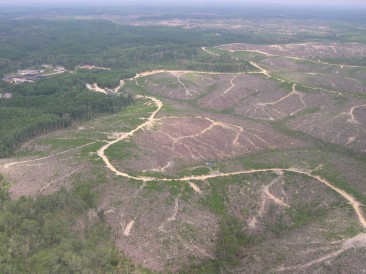
Author: Will McFarland, in Jakarta
The headline news in the Jakarta Globe earlier this week was that Indonesia’s economy has risen to 10th in the ranking of global economies. BUT, the analysis and commentary went on to say, the country’s growth is unequal, doesn’t benefit the poorest and is vulnerable. The next president faces the task of improving the quality of growth.
On Tuesday the same paper was filled with headlines from the Forests Asia Summit, which was one of the reasons I was in Jakarta for the week. In his keynote speech, Indonesian President Susilo Bambang Yudhoyono (SBY) made a plea for his successor to continue his commitments to reduce deforestation in the country and ensure that Indonesia finds a way to reduce its rapid deforestation rates.
So, what’s the link?
Indonesia’s economy and forests are inseparable. As the world’s biggest producer of palm oil, a US$ 40 billion industry globally, much of Indonesia’s economic activity centres on clearing forest. Palm oil is Indonesia’s second-largest export and generates huge tax revenue for the government. The domestic palm oil industry is a large part of the recent economic growth and it effectively contributes to ensuring that Indonesia’s 240 million citizens have better lives. However, Indonesia has made international commitments to reduce the rate of deforestation and knows that action is vital to tackle its serious contribution to global as well as local environmental and social issues.
Assuming that in the short to medium term that Indonesia’s economy will continue to rely heavily on palm, timber and other agricultural products, a delicate balance is needed between growth and environmental impact. SBY said this himself on Tuesday, “it’s about striking a balance…the central tenet of the strategy is about creating prosperity for everyone, in a way that does not harm the natural environment”.
There are many parallel issues that need addressing in order to achieve this, linking Indonesia’s forest reforms with a wide range of social and economic challenges. Conflict with local communities, dealing with fire and haze, and regulation of the private companies that dominate the industrial landscape in Indonesia are just a few of them. No single policy or action will manage to achieve this, and no single actor is responsible. Instead a multi-stakeholder approach is required, and this week a UN-REDD Programme, UNEP Finance Initiative, UNORCID and UNDP’s Green Commodities Programme convened workshop brought many of these stakeholders together in the first of three regional workshops to try and identify a coherent package.
Reducing forest loss while maintaining a strong economy can be delivered in two ways: firstly making more of the land available and creating more value in Indonesia (leaving remaining forest to be protected); or if deforestation is needed, ensuring that it is as low-impact as possible. Making more from the existing land could be achieved by attaining price premiums for certified products, or increasing yields form better practices and agro-technology. Creating “added-value” in the supply chains is also a key challenge for Indonesia as much of the palm oil it exports is unprocessed. Reducing the impact of deforestation can be done by avoiding high-conservation value areas, and peat draining and burning, perhaps by prioritising conversion of land that is already deforested and used for other purposes.
None of these are brand new ideas. And they are complex and difficult to achieve. But where innovation and investment of time, minds and capital is needed is in identifying how to promote, encourage, or force the shift of business practice to the types activities outlined above.
The workshop identified a suite of financial instruments and policy interventions that could drive private sector change. Potentially scalable and feasible ideas emerged, including:
• Wide ranging legal policy reform including removing perverse incentives and subsidies to the palm oil sector;
• Design of green bonds and development impact bonds to finance sustainable production;
• Building an economics evidence base that unpicks the implications of changing the sector’s practices.
Delivering these would require collaboration from the national and provincial governments, the financial sector, research and NGO partners, and early movers in the palm oil industry itself.
The front-page headline of today’s newspaper bemoans the lack of innovation in Indonesia’s economy – and the need for investment in skills and technologies in order to strengthen Indonesia’s economy, reduce its reliance on and exposure to other economies, and ultimately lead to improved quality of life in Indonesia. If we join the dots between this week’s headlines, and the evidence and discourse emerging from the research and thinking at this week’s summit and workshops, it appears that investing in changing practices to reduce deforestation is a no-brainer for solving Indonesia’s other prominent social and economic problems.

Bio: Will McFarland is a Research Officer at ODI in the Climate and Environment Programme. He works on green growth, natural resources and forests.
|